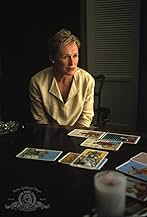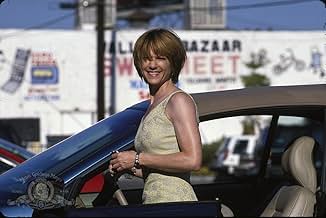VALUTAZIONE IMDb
6,4/10
7467
LA TUA VALUTAZIONE
Aggiungi una trama nella tua linguaFive California women struggle with personal problems as their own paths unwind in unexpected ways.Five California women struggle with personal problems as their own paths unwind in unexpected ways.Five California women struggle with personal problems as their own paths unwind in unexpected ways.
- Regia
- Sceneggiatura
- Star
- Candidato a 1 Primetime Emmy
- 2 vittorie e 1 candidatura in totale
Penelope Allen
- Nancy (segment "Fantasies About Rebecca")
- (as Penny Allen)
Trama
Lo sapevi?
- QuizA Braille book that Carol Faber reads is "One Hundred Years of Solitude" by Gabriel García Márquez who happens to be the father of Rodrigo García, this film's director.
- ConnessioniFeatured in The Rosie O'Donnell Show: Episodio #4.170 (2000)
Recensione in evidenza
Things you can tell just by looking at her
In Things you can tell just by looking at her we meet several women who for different reasons seem to be playing bit parts in their own lives. One of them takes care of her mother in a big lonely house, Rebecca stops listening to her own feelings because a baby does not fit into the life of her married lover, Rose discovers that her son is growing up, Calista's girlfriend is dying and ? takes care of her blind sister.
After watching the film I thought: what does this film want to tell us about women? Or perhaps people in general. Some of the lines in the film stuck in my mind: The blind girl says about the woman who committed suicide: `I bet you could tell just by looking at her that there was a man involved.' When giving this line some thought I starting seeing the film as a comment on `loneliness' in general. What do people really want? They want to be involved with people. They want other people to see them.
The film suggests that when people don't depend on anyone anymore when they have no one `to be' for - they chose to actually become nothing to die. The loneliness at the heart of existence is too hard to bear. I think the film is about the nature of making connections and being involved with other people although it is painful and sometimes lead to self-sacrifice. It shows us the horror which is tied with the fear of being left alone, although the connections which are made does little to remove the feeling of loneliness. It is the horror of a stranger walking into your personal sphere and immediately being able to see through you and see what lies beneath the surface. It is the horror of revealing your interest in other people - looking in on other peoples lives, in a desperate attempt to connect and to become involved. It is the horror of becoming involved with someone who cannot stay, the horror of losing those whom you connect with. When you are involved, and when you connect with someone, you face the danger of being hurt, being dumped - of sacrificing your own life in your care for others. It is the horror also that your sacrifice is not appreciated, the horror that when you are no longer a lover or a mother then you will certainly become nothing that your identity is so intricately tied with the dependence of those who need you that you cannot be `you' if they don't need you anymore. It is ultimately the horror of being defined by relations of interdependence where the people you care for in effect give you identity. It is the horror that you really are nothing without other people to mirror yourself in.
Why is this form of `self-sacrifice' then particular to women? We learn from Walter's daughter that when he really gets involved `He dumps them like a hot potato'. Are women victims and easy to exploit? Rose's teenage son confides that people `are always' looking for someone. But is the act of making these connections and becoming involved truly more important to women - truly more essential in their attempt at becoming someone - of gaining an identity. Are women always characterized by either being cared for or being the ones who take care of others? Interestingly, none of these women are wives - they are defined by other types of relationships than those that arise between man and wife.
I do not think I can answer these questions and I don't think the film wants to answer them either. But I think the film is a point of departure for discussing the nature of being - and the way we all perhaps depend upon others in order to become.
7/10
In Things you can tell just by looking at her we meet several women who for different reasons seem to be playing bit parts in their own lives. One of them takes care of her mother in a big lonely house, Rebecca stops listening to her own feelings because a baby does not fit into the life of her married lover, Rose discovers that her son is growing up, Calista's girlfriend is dying and ? takes care of her blind sister.
After watching the film I thought: what does this film want to tell us about women? Or perhaps people in general. Some of the lines in the film stuck in my mind: The blind girl says about the woman who committed suicide: `I bet you could tell just by looking at her that there was a man involved.' When giving this line some thought I starting seeing the film as a comment on `loneliness' in general. What do people really want? They want to be involved with people. They want other people to see them.
The film suggests that when people don't depend on anyone anymore when they have no one `to be' for - they chose to actually become nothing to die. The loneliness at the heart of existence is too hard to bear. I think the film is about the nature of making connections and being involved with other people although it is painful and sometimes lead to self-sacrifice. It shows us the horror which is tied with the fear of being left alone, although the connections which are made does little to remove the feeling of loneliness. It is the horror of a stranger walking into your personal sphere and immediately being able to see through you and see what lies beneath the surface. It is the horror of revealing your interest in other people - looking in on other peoples lives, in a desperate attempt to connect and to become involved. It is the horror of becoming involved with someone who cannot stay, the horror of losing those whom you connect with. When you are involved, and when you connect with someone, you face the danger of being hurt, being dumped - of sacrificing your own life in your care for others. It is the horror also that your sacrifice is not appreciated, the horror that when you are no longer a lover or a mother then you will certainly become nothing that your identity is so intricately tied with the dependence of those who need you that you cannot be `you' if they don't need you anymore. It is ultimately the horror of being defined by relations of interdependence where the people you care for in effect give you identity. It is the horror that you really are nothing without other people to mirror yourself in.
Why is this form of `self-sacrifice' then particular to women? We learn from Walter's daughter that when he really gets involved `He dumps them like a hot potato'. Are women victims and easy to exploit? Rose's teenage son confides that people `are always' looking for someone. But is the act of making these connections and becoming involved truly more important to women - truly more essential in their attempt at becoming someone - of gaining an identity. Are women always characterized by either being cared for or being the ones who take care of others? Interestingly, none of these women are wives - they are defined by other types of relationships than those that arise between man and wife.
I do not think I can answer these questions and I don't think the film wants to answer them either. But I think the film is a point of departure for discussing the nature of being - and the way we all perhaps depend upon others in order to become.
7/10
- sannelehmann
- 20 gen 2002
- Permalink
I più visti
Accedi per valutare e creare un elenco di titoli salvati per ottenere consigli personalizzati
- How long is Things You Can Tell Just by Looking at Her?Powered by Alexa
Dettagli
- Data di uscita
- Paese di origine
- Sito ufficiale
- Lingua
- Celebre anche come
- Things You Can Tell Just by Looking at Her
- Luoghi delle riprese
- Aziende produttrici
- Vedi altri crediti dell’azienda su IMDbPro
Botteghino
- Lordo in tutto il mondo
- 1.433.668 USD
- Tempo di esecuzione1 ora 49 minuti
- Colore
- Mix di suoni
- Proporzioni
- 1.85 : 1
Contribuisci a questa pagina
Suggerisci una modifica o aggiungi i contenuti mancanti

Divario superiore
By what name was Le cose che so di lei (2000) officially released in India in English?
Rispondi





































